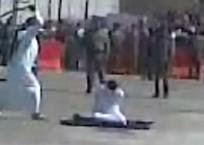 |
| File Photo: Jotindra Bodipriyo Larma aka Shantu Larma, chairman Parbattya Chattagram Janasanghati Samity |
SALEEM SAMAD
FORMER GUERRILLA commander, now leader of the indigenous people has dubbed the Bangladesh authority as “betrayal” of their political autonomy of the ethnic minorities living in the hill forest in south-east region.
The insurgent leaders of the Mongoloid ethnic communities signed a peace accord after two decades of bush war, since then the implementation of the accord was flouted by the government.
Jotindra Bodipriyo Larma aka Shantu Larma, chairman of Parbattya Chattagram Janasanghati Samity told journalists on Wednesday that the government is engaged in dilly-dallying tactics since the accord was signed 14 years ago.
He threatened the government non-violent movement from the new year to press home their 19 points charter of demands, which includes regional autonomy, withdrawal of military troops and special status of the indigenous people.
In a statement, the rebel leader urged the government to abrogate the “state religion Islam” from the recently amended constitution.
Larma protested the government’s denial to recognize the non-Muslim ethnic communities as indigenous people, acknowledged by the International Labor Organizations Convention 169, a legally binding international instrument. Thus, he said the authority also denies the political, economical, social, cultural and human rights of the ethnics, which constitutes less than one percent of the population.
He criticized the reasoning for continued presence of huge contingent of military in the Chittagong Hill Tracts after surrender of the insurgents and weapons 14 years ago. The military were blamed for political instability and often racial skirmishes by Bangla-speaking Muslims settled from the land-hungry plain lands.
Responding to a reporter, Larma said the government is not pro-people and pro-secular, therefore they lost hopes for peace in the volatile hill forest.
Meanwhile, the leaders of the Chittagong Hill Tracts Commission, based in Copenhagen told a press conference in capital Dhaka that they had to abandon the last leg of the international mission due to intimidation of the security agencies.
Co-chair Sultana Kamal and Elsa Stamtopoulou jointly briefing the media after a week of their mission to CHT said that a culture of impunity prevails in the region, for the authorities nonchalant to hold independent inquiry into several racial riots since 2008.
The mission leader Stamtopoulou said in the face of unprecedented obstruction and interference from administration officials and intelligence agencies during the parleys with victims of human rights and civil society groups in picturesque Rangamati and Bandarban administrative towns, the Commission was compelled to discontinue its planned mission last Friday.
The Commission squarely blamed the military and law enforcing agencies for continued human rights violation in hill forest, which is one-tenth of Bangladesh where the ethnic Mongoloids were living in seclusion for centuries.
This has encouraged racial hatreds among the hill people and Muslim settlers, which has fueled distrust among the ethnic communities for non-implementation of the peace accord signed by insurgents and the government for more than a decade.
However, Elsa said she is hopeful of confidence building measures among the settlers from plain lands and indigenous people, which needs to be initiated by the government and civil society actors.
Saleem Samad, an Ashoka Fellow is an award winning investigative journalist based in Bangladesh. He specializes on Islamic terrorism, forced migration, good governance and elective democracy. He has recently returned from exile from Canada after return of democracy. He could be reached at saleemsamad@hotmail.com
















